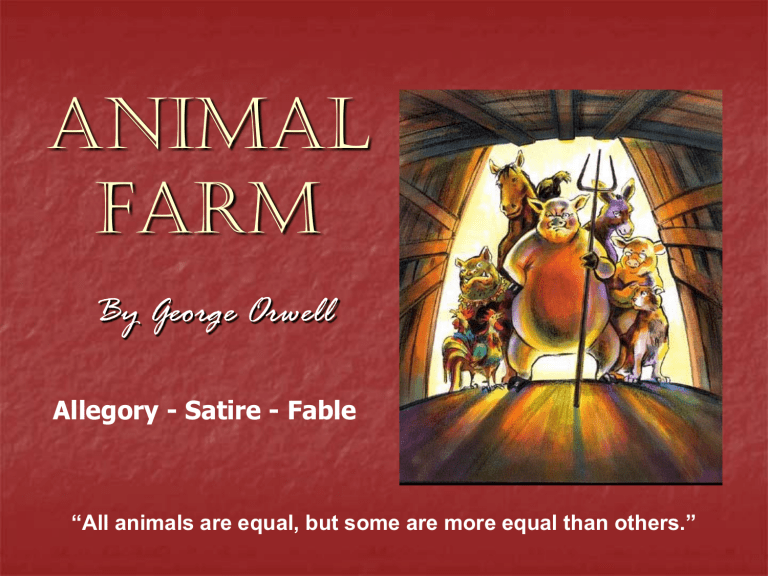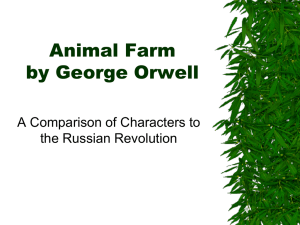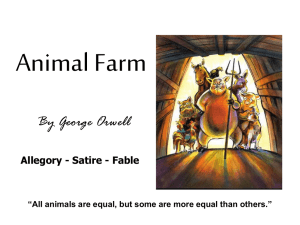
Animal Farm By George Orwell Allegory - Satire - Fable “All animals are equal, but some are more equal than others.” George Orwell British Author & Journalist 1903-1950 Born in India, which was part of the British Empire father an agent in the Indian Civil Service family was not very wealthy Orwell later described them ironically as "lower-uppermiddle class.” owned no property, had no extensive investments; totally dependent on the British Empire for their livelihood and prospects “Liberty is telling people what they do not want to hear.” George Orwell and His Beliefs had a reputation for standing apart “outsider” position often led him to oppose the crowd beliefs about politics affected by experiences fighting in the Spanish Civil War viewed socialists, communists, and fascists as repressive and self-serving skeptical of governments and their willingness to forsake ideals in favor of power George Orwell’s real name was Eric Blair. What is Animal Farm? political satire about oppressed individuals who long for freedom but are corrupted by the very power that had originally oppressed them story traces the horrible conditions of mistreated animals who can speak and exhibit many other human characteristics society the animals form is generally viewed as Orwell's critique of the communist system in the former Soviet Union. Orwell initially struggled to find a publisher for Animal Farm. Significance Today Soviet Communism has fallen and the Cold War is long over – Why does Animal Farm deserve our attention? The answer lies in the power of allegory. Allegorical fables require us to make comparisons and connections, making them meaningful to any reader in any historical period. The story of Animal Farm will always have lessons to teach us about the ways that people abuse power and manipulate others. Themes in Animal Farm Authority figures who have no one to answer to can become too powerful and corrupt. People can manipulate language to benefit themselves, especially if no one asks questions. Power over others can destroy an individual’s concept of right and wrong. Human rights can be violated when one group or class believes it is superior to another. If people want to be treated fairly and respectfully, they must not blindly follow the crowd. The truth can be twisted to become whatever someone wants it to be. Words and ideas can be more powerful than weapons. The Fable one of the oldest literary forms, it is a short, instructional tale that conveys a clear moral or message. earliest fables date back to 6th century Greece B.C.E. The author of these fables, Aesop, used animal characters to stand for human "types." For example, a fox character might embody the human characteristics of cunning and cleverness. Allegory Most fables have two levels of meaning. On the surface, the fable is about animals. But on a second level, the animals stand for types of people or ideas. The way the animals interact and the way the plot unfolds says something about the nature of people. Any type of fiction that has multiple levels of meaning in this way is called an allegory. Allegory Boxer Animal Farm is strongly allegorical, but it presents a balance between levels of meaning. On the first level, the story about the animals is very moving. It’s upsetting when the animals are treated cruelly. At the same time, each of the animals serves as a symbol. The story's second level involves Orwell’s critique of Soviet Russia. Satire In a satire, the writer attacks a serious issue by presenting it in a ridiculous light or otherwise poking fun at it. Orwell uses satire to expose what he saw as the myth of Soviet socialism. Soviet Coat of Arms Irony Satire and irony are closely related. Irony results when there is a discrepancy between what an audience would expect and what really happens. Snowball below the commandments. Orwell uses dramatic irony to create a subtle satire. We see the hypocrisy that the animals don't and can understand that the book is deeply critical of the pigs. Napoleon overindulging himself. When History and Literature Merge Critics often consider Animal Farm to be an allegory of the Russian Revolution. In the early 1900s, Russia’s Czar Nicholas II faced an unhappy population. Freed from feudal serfdom in 1861, many Russian peasants were Czar Nicholas II struggling to survive under an oppressive government. By 1917, amidst the tremendous suffering of World War I, a revolution began. In two major battles, the Czar’s government was overthrown and Vladimir Lenin replaced by the Bolshevik leadership of Vladimir Lenin. History and Literature When Lenin died in 1924, his former colleagues Leon Trotsky, hero of the early Revolution, and Joseph Stalin, head of the Communist Party, struggled for power. Stalin won the battle, and he deported Trotsky into permanent exile. Joseph Stalin Leon Trotsky Joseph Stalin Moved the Soviet Union into the modern industrial age Seized land in order to create collective farms Five Year Plan was an attempt to modernize Soviet industry. Many peasants refused to give up their land, so to counter resistance Stalin used vicious military tactics. Rigged trials led to executions of an estimated 20 million government officials and ordinary citizens. The government controlled the flow and content of information to the people, and all but outlawed churches. Joseph Stalin Animalism = Communism Animalism Taught by Old Major No rich, but no poor Better life for workers All animals are equal Everyone owns the farm Communism Invented by Karl Marx All people are equal Government owns everything People own the government Animal Farm Revolution = Russian Revolution Animal Farm Revolution Was supposed to make life better for all, but . . . Life was worse at the end. The leaders became the same as, or worse than the other farmers (humans) they rebelled against. Russian Revolution Was supposed to fix the problems created by the Czar, but . . . Life was even worse after the revolution. Stalin made the Czar look like a nice guy. Farmer Jones = Czar Nicholas II Farmer Jones The irresponsible owner of the farm Lets his animals starve and beats them with a whip Sometimes shows random kindness Czar Nicholas II Weak Russian leader during the early 1900s Often cruel and brutal to his subjects Displays isolated kindness Old Major=Karl Marx Old Major Male pig whose speech about the evils perpetrated by humans rouses the animals into rebelling Unites the animals with the song “Beasts of England” Dies before revolution Karl Marx The inventor of communism Wants to unite the working class to overthrow the government Dies before the Russian Revolution Napoleon = Joseph Stalin Napoleon Male pig who leads the rebellion against Farmer Jones After the rebellion’s success, he begins to control all aspects of the farm until he is an undisputed tyrant. Joseph Stalin The communist dictator of the Soviet Union from 1922-1953 who killed all who opposed him. He loved power and used the KGB to enforce his ruthless, corrupt antics. Snowball = Leon Trotsky Snowball Male pig who becomes one of the rebellion’s most valuable leaders Chased off of the farm forever by Napoleon’s dogs and thereafter used as a scapegoat for the animals’ troubles Leon Trotsky A pure communist leader who was influenced by the teachings of Karl Marx He wanted to improve life for people in Russia, but was driven away by Lenin’s KGB Squealer More Pigs A big mouth pig who becomes Napoleon’s mouthpiece. Throughout the novel, he displays his ability to manipulate the animals’ thoughts through the use of propaganda. Represents the propaganda department that worked to support Stalin’s image; the members of the department would use lies to convince the people to follow Stalin. Minimus Pig who writes propaganda poems and songs praising Napoleon and Animal Farm Represents the takeover of art by propaganda Human Pig Whymper Lawyer who acts as “an intermediary between Animal Farm and the outside world." He's the first human the pigs permit contact with after the Rebellion, constantly shows up in minor role to pass on communications from Napoleon to the other humans. An allusion to all the Westerners who catered to Soviet interests and helped spread the Soviet myth for personal profit Human Neighbors Mr. Pilkington Owns Foxwood, finds a way to profit from Animal Farm by forming an alliance with the pigs. Character is based on Winston Churchill and FDR and represents western capitalist countries like the British empire. Mr. Frederick Owns Pinchfield, worried that the Rebellion will spread to other farms, he goes on the attack by spreading rumors He's also a symbol for Hitler. Horses Boxer Strongest animal on the farm; he’s loyal but not bright; he questions nothing Represents the dedicated, but tricked, supporters of Stalin. Many stayed loyal even after it was obvious Stalin was a tyrant. Eventually they were betrayed, ignored, and even killed by him. Horses Clover Boxer’s friend, she’s loyal and strong but not well spoken Represents female laborers Mollie Ignorant, vain, and materialistic, she resists the animal rebellion because she doesn't want to be uncomfortable Represents vain, selfish people in Russia and elsewhere who ignored the revolution and sought residence in more inviting countries. “Smart” Characters Muriel A goat who believes in the rebellion, she watches as Animal Farm slips away from its founding principles. Benjamin The most cynical of all the animals, the farm's donkey doubts the leadership of the pigs but is faithfully devoted to Boxer. Benjamin represents all the skeptical people in Russia and elsewhere who weren’t sure revolution would change anything. Like Benjamin, many of them chose to remain neutral. “Smart” Characters Moses A tame raven who tells the animals stories about a paradise called Sugarcandy Mountain. Moses represents religion. Stalin used religious principles to influence people to work and to avoid revolt. Dogs Jessie, Bluebell, and Pincher The farm's sheepdogs, they are loyal and don’t try to change things. They (involuntarily) give Napoleon his bodyguards: Nine puppies raised to force the animals to work; they use fear to dominate any opponent of Napoleon. The dogs represent Stalin’s loyal KGB, mercenaries used to force support for Stalin. Sheep Not tremendously clever, the sheep remind themselves of the principles of animalism by chanting "four legs good, two legs bad." They represent the people who blindly follow their leaders.

![Allegory and Satire [Word 2010 version]](http://s2.studylib.net/store/data/015070516_1-e1b68216b1de0c87c7a46182765b786f-300x300.png)
